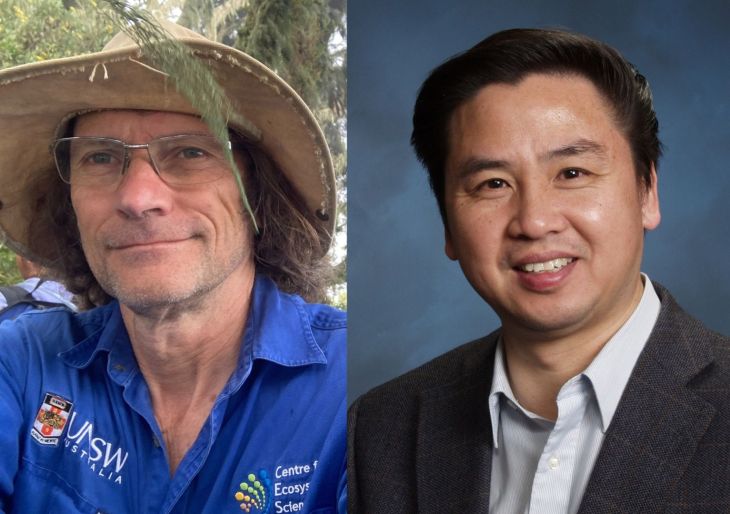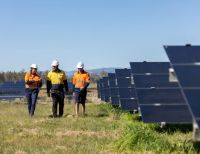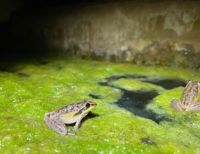UNSW Professor David Keith and Scientia Professor Liming Dai have been recognised among the nation’s most distinguished scientists.
Professor David Keith and Scientia Professor Liming Dai have been elected Fellows by their peers for ground-breaking research. Photo: UNSW.
Two UNSW Sydney academics have been honoured with election as 2023 Fellows of the Australian Academy of Science for their outstanding contribution to new approaches to ecosystem management and developing materials for renewable energy technologies.
Professor David Keith and Scientia Professor Liming Dai were among 20 researchers announced today as members of the Academy. The Fellows are among Australia’s most distinguished scientists, elected by their peers for ground-breaking research.
President of the Australian Academy of Science Professor Chennupati Jagadish AC said: “There is no greater professional honour than being recognised by your own peers and the leaders within your own field of research for your achievements.
“This year’s new Fellows come from countries including Germany, China, India and Italy and all now call Australia home.”
Leading scientist on carbon-based materials for renewable energy technologies
Prof. Dai from the School of Chemical Engineering is internationally recognised as a leading authority in developing carbon-based materials used in renewable energy technologies.
“I am honoured to be elected by my peers as a Fellow and would like to thank all my team members and colleagues who have worked with me and supported my research, particularly those at UNSW such as Professors Rose Amal and Zhenhai Xia. I think my election is a recognition of not only my own research but also the new research field of carbon-based metal-free electrocatalysis,” Prof. Dai said.
His research focuses on how polymers and carbon nanomaterials are created, as well as gaining a deep understanding of their properties.
“I apply this knowledge to develop useful devices in areas such as clean energy and biomedical technology. My work involves connecting nanoscale science with practical applications to address real-world challenges,” Prof. Dai said.
One of Prof. Dai’s biggest contributions has been the creation of a material called carbon-based metal-free electrocatalysts, which are used in clean energy technologies such as fuel cells, advanced batteries, and water-splitting systems.
His current research focus is on the ARC Centre of Excellence for Carbon Science and Innovation. The Centre aims to develop and study the next generation of carbon catalysts for clean production of chemicals to reduce carbon emissions and energy conversion and storage with zero emissions.
Professor Stephen Foster, Dean of UNSW Engineering, congratulated his colleague on the prestigious achievement.
“Liming is a pioneer in creating efficient and sustainable solutions for clean energy production. His dedication to advancing renewable energy technologies through his work on carbon-based materials is outstanding. His work is helping us achieve a cleaner and more sustainable future," Prof. Foster said.
International leader in conservation science
Prof. Keith is one of Australia’s leading ecosystem scientists and is widely recognised for his contributions to biodiversity risk assessment and new approaches to conserving, restoring, and sustainably using ecosystems.
Based at UNSW’s School of Biological, Earth and Environmental Science, and previously holding a joint appointment with the NSW Department of Planning, Industry and Environment, he bridges the gap between academia and government, integrating scientific advancements into public policy.
“I am greatly honoured to be elected as a Fellow of the Academy. It provides an opportunity to work with respected colleagues to further awareness and mainstreaming of quality science in tackling real-world issues of national and global significance,” Prof. Keith said.
Prof. Keith focuses on the management of diverse ecosystems, including forests, wetlands, alpine regions, and arid environments. His research explores critical aspects such as bushfire ecology, native vegetation science, and the impacts of land use change, invasive species, altered fire regimes, and climate change on ecosystems.
Recognising the interconnectedness between people and nature, he emphasises the vital importance of ecosystem conservation for the well-being and prosperity of both species and societies.
“The highlight for me is when my research innovations are taken up widely in policy and action is taken to conserve biodiversity. These include mainstreaming of more rigorous vegetation survey and mapping methods, uptake of innovative frameworks to manage bushfires for biodiversity conservation, adoption of the Red List of Ecosystems as the global standard for ecosystem risk assessment and Headline Indicator of the new United Nations Global Biodiversity Framework, and the uptake of the Global Ecosystem Typology as a framework for managing ecosystems,” Prof. Keith said.
“My current research is focused in two areas. The first aims to improve Australia's capability to stem the loss of biodiversity under changing fire and climate regimes. The second aims to build capacity for ecosystem conservation internationally and within Australia.
“Although natural and semi-natural ecosystems have been somewhat neglected as focal points for biodiversity conservation, they are essential linchpins for both species survival and human well-being across its health, socio-cultural and economic dimensions.”
UNSW Dean of Science Scientia Professor Sven Rogge congratulated Prof. Keith on being elected a Fellow of the Australian Academy of Sciences.
“David is committed to embedding his scientific knowledge into applied ecosystem solutions. I am pleased that David’s impact in both biodiversity research and management is being reconsidered by the Academy. This prestigious fellowship is a testament to his environmental leadership and wide-reaching contributions to ecosystems science and public policy,” Prof. Rogge said.







